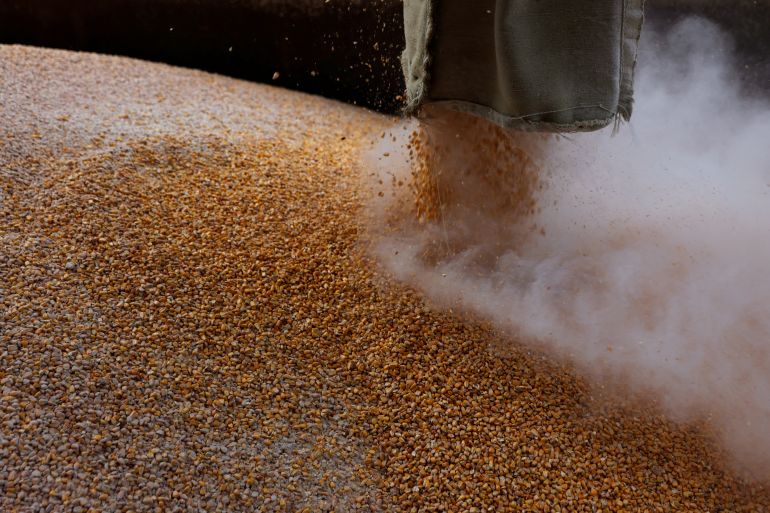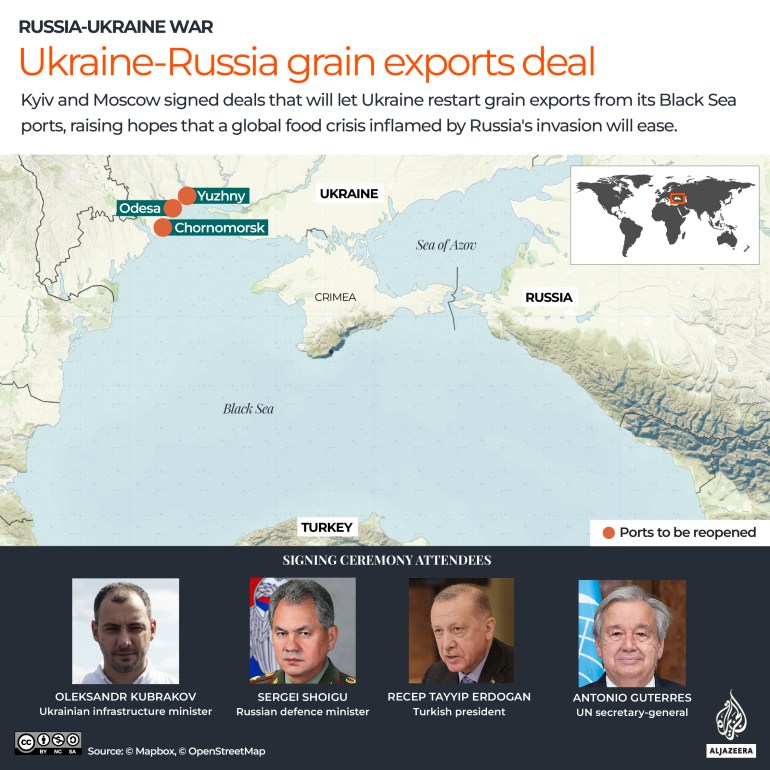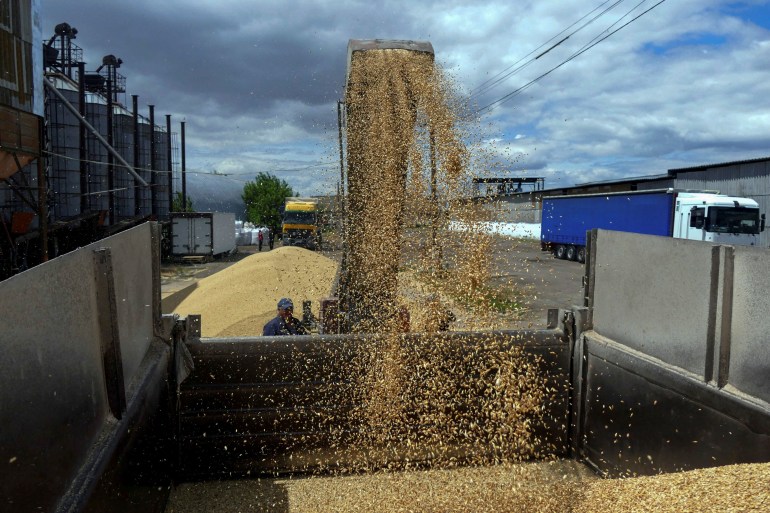Russia and Ukraine sign grain export deal: What you should know
Russian and Ukraine pen agreement with UN and Turkey on reopening blocked Black Sea routes for grain exports.

Russia and Ukraine have signed a landmark deal with the United Nations and Turkey on resuming grain shipments in an attempt to ease a global food crisis in which millions face hunger.
Russian defence minister Sergei Shoigu and Ukrainian infrastructure minister Oleksandr Kubrakov each signed separate but identical agreements with UN and Turkish officials on reopening blocked Black Sea delivery routes.
Keep reading
list of 4 itemsRussia pounds Ukraine’s cities and front lines as air defences dwindle
Russia-Ukraine war: List of key events, day 784
Is China growing tired of Russia’s war in Ukraine?
Kyiv officials said they did not want to put their name on the same document as the Russians because of the five-month war that has killed thousands and displaced millions of Ukrainians.
Here is what you need to know:
What is the objective of the deal?
Russia’s invasion of Ukraine on February 24 led to a de-facto blockade of the Black Sea, resulting in Ukraine’s exports dropping to one-sixth of their pre-war level. Both Kyiv and Moscow are among the largest exporters of grain in the world, and the blockade has caused grain prices to rise dramatically.
The deal aims to help avert famine by injecting more wheat, sunflower oil, fertiliser and other products into world markets, including for humanitarian needs. It targets the pre-war level of five million metric tonnes of grain exported each month.
The UN World Food Programme says some 47 million people are now in a stage of “acute hunger” due to fallout from the war and experts have long warned of a looming global food crisis if Ukrainian grain exports remained blocked.
Ukraine also needs to empty its silos ahead of a coming harvest, while more exported fertiliser will avoid lower global yields for coming harvests.
Russia and the UN also signed a memorandum of understanding committing the latter to facilitate unimpeded access to global markets for Russian fertiliser and other products.

When will grain exports resume?
According to Russia’s Shoigu, grain exports could restart in the “next few days”.
“Today we have all the prerequisites and all the solutions for this process to begin in the next few days,” Shoigu said after signing the deal.
Al Jazeera’s Diplomatic Editor James Bays, reporting from the UN headquarters, said it could be a “couple of weeks” before the first shipment of grain leaves Ukraine.
“There will be a test of implementation in the coming weeks,” Bays said, noting the backlog of millions of tonnes of Ukrainian grain in the country. “It is going to take some time to get all of that grain out – experts estimate probably about four months,” he added.
The deal is valid for four months or 120 days and will be automatically renewed unless the war ends.
Which ports are included?
UN Secretary-General Antonio Guterres said the accord would open the way to commercial food exports from three key Ukrainian ports – Odesa, Chernomorsk and Yuzhny.
A UN official told Reuters the deal included a “de facto ceasefire” for the ships and facilities covered.

How will the deal be implemented?
Guterres said there will be a Joint Control Center (JCC) in Istanbul, which will schedule and monitor shipments.
According to one UN official, the JCC will be staffed by officials from the UN and probably military officials from the three countries involved, Reuters reported.
Though Ukraine has mined the waters near the ports as part of its war defences, there is no further need for de-mining. Rather, Ukrainian pilots will guide the ships along safe channels in its territorial waters, with a minesweeper vessel on hand as needed but no military escorts.
Monitored by the JCC, the ships then transit the Black Sea to Turkey’s Bosphorus Strait and off to world markets.
All sides have agreed there will be no attacks on these entities. If a prohibited activity is observed, it will be the task of the JCC to “resolve” it, the official said without elaborating.
In response to Russian concerns about ships delivering weapons to Ukraine, all returning ships will be inspected at a Turkish port by a team with representatives from all parties and overseen by the JCC. The teams will board vessels and assess their cargo before they can return to Ukraine.
‘A beacon of hope’: How the world reacted
Russia
Defence minister Shoigu has said Moscow will not take advantage of the fact that the ports will be demined and opened. “We have made this commitment,” he said.
Ukraine
Foreign minister Dmytro Kuleba said Kyiv trusts the UN, not Russia, to uphold the deal.
“Ukraine doesn’t trust Russia. I don’t think anyone has reasons to trust Russia. We invest our trust in the United Nations as the driving force of this agreement,” Kuleba said at an online press briefing.
United Nations
Guterres said there was now a “beacon on the Black Sea” after the “unprecedented” agreement was finalised.
“A beacon of hope … possibility … and relief in a world that needs it more than ever,” he added.
The agreement signed today by Ukraine, the Russian Federation & Türkiye under UN auspices opens a path for commercial food exports from Ukraine in the Black Sea.
It will help avoid a food shortage catastrophe for millions worldwide.
It is a beacon of hope, possibility & relief.
— António Guterres (@antonioguterres) July 22, 2022
Turkey
President Recep Tayyip Erdogan said the pact will “renew hopes for peace”.
“With the ship traffic that will start in the coming days, we will open a new breathing tube from the Black Sea to many countries of the world,” he added after the deal signing.
European Union
EU foreign policy chief Josep Borrell says the deal was a “critical step” in helping reduce global food insecurity.
“EU remains committed to help Ukraine bring as much of its grain into global markets as possible,” he wrote on Twitter.
The agreements signed by Ukraine, Russia, Turkey & @UN are a critical step in overcoming the global food insecurity caused by Russia‘s aggression against Ukraine.
EU remains committed to help #Ukraine bring as much of its grain into global markets as possible.
Full Statement: https://t.co/fAC3vuh7nY
— Josep Borrell Fontelles (@JosepBorrellF) July 22, 2022
United States
The US called on Russia to allow Ukrainian grain to be exported quickly and voiced hope that the Turkish-brokered deal was well-structured enough to monitor compliance.
“We fully expect the implementation of today’s arrangement to commence swiftly to prevent the world’s most vulnerable from sliding into deeper insecurity and malnutrition,” White House spokesman John Kirby told reporters.